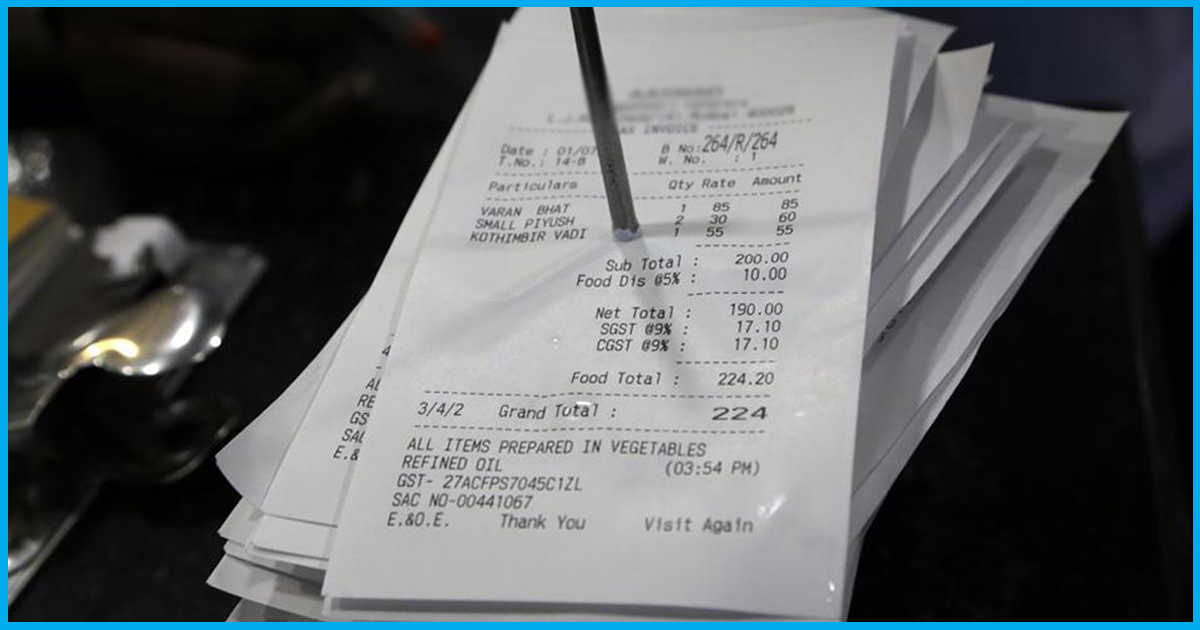
Bills, Receipts And Invoices We Use Daily Pose Risks To Our Health; Know How
11 July 2017 1:17 PM GMT
Consumers are facing the issue of the ink on bills, cash memos, invoices, etc., fading out, thus making it immensely difficult to fight for their rights with dealers and retailers. The chemicals used in them are also resulting in health risks.
As reported by Plastic Pollution Coalition, the chemicals called Bisphenol A (BPA) and Bisphenol S (BPS) being used by many companies either in cash register receipts or credit/debit machines are still predominating the thermal paper market and can cause human health concerns.
The Mumbai Mirror reported of instances where consumers could not get their faulty items bought from retail stores exchanged because the ink in the bills had completely faded out. The issue further escalates if the payment is made in cash and not card because the customer does not have a bank copy of the said payment.
In 2015, the Sales Tax Department had issued a circular directing all the dealers and retailers to discontinue the use of the thermal paper practice.
The Consumer Guidance Society of India (CGSI) had written to the Sales Tax Department while emphasising the need for putting an end to the thermal paper usage.
CGSI of India is a government-aided organisation and is the first and foremost consumer body in the country.
Dr M S Kamath, the secretary of CGSI, told Mumbai Mirror that several cases have been reported so far where a consumer was not able to file a complaint or even claim warranty as the bill was made on thermal paper. “The consumers/buyers have brought this fact to the notice of the government. Consumers face difficulty especially when the product carries a guarantee/warranty for a certain period. In the absence of a legible bill, it becomes difficult for the buyer to approach the consumer redressal forum,” he said.
Kamath also added that the Sales Tax department had issued a circular on 29 October 2015 that asked all dealers, who are liable to pay tax, to discontinue the practice of issuing invoices, bills and cash memos on thermal paper.
However, several dealers continue to use cheap thermal paper in a bid to cut costs, he revealed – pointing the Sales Tax Department’s failure to respond to CGSI recommendation.
Health risks of thermal papers
“The US Food and Drug Administration currently is reassessing what it considers a safe level of exposure to BPA, which some studies show is linked with increased risks of certain cancers, diabetes, reproductive abnormalities, and heart disease,” reads a 2009 article by the Consumer Reports.
Five year hence, the Consumer Reports wrote another piece on the study of Bisphenol A (BPA), which said, “Concerns about the safety of Bisphenol A (BPA) have prompted a federal ban on the chemical in baby bottles and sippy cups, and some manufacturers have now removed it from water bottles and food containers. But the thermal paper used for cash register and other receipts is another common source of BPA. And a new study shows for the first time that handling the paper leads to increased levels of the chemical in the body.”
BPA can be consumed through our skin, adds the study. Research has linked BPA to an increased risk of breast and prostate cancers, cardiovascular disease, and reproductive and brain development abnormalities. As it imitates the biological activity of estrogen, developing children face the greatest risks from the chemical.
A piece by Minnesota Pollution Control Agency says, “A chronically high oestrogen level disrupts the male and female reproductive and endocrine systems.” It adds, “High levels are associated with altered thyroid function, obesity, diabetes, heart disease, impaired liver and kidney function, inflammation, hyperactivity, and impaired learning. In men, such levels have been linked to reduced libido, lower sperm quality, and altered sex hormone concentrations. And in women, these levels have been tied to reproductive effects such as polycystic ovary syndrome, infertility, miscarriage, premature delivery, and an increased risk of breast cancer. Women may be especially vulnerable to the BPA in receipts.”
The United States Environmental Protection Agency has said BPS may pose health hazards similar to BPA because the two chemicals are structurally alike and Bisphenol S (BPS) is also easily transferred to the skin.
What can you do to reduce exposure?
Plastic Pollution Coalition lists the following methods to reduce BPA exposure:
- Be aware that thermal paper discolours easily when scratched with a coin or paperclip.
- Don’t accept receipts whenever possible.
- Go with a paperless receipt via email or text message. This is an increasingly available option for many retailers.
- If you must handle a receipt, try to touch only the non-glossy backside. It contains much less BPA.
- Carefully store receipts. If you absolutely need a receipt, place it in an envelope. Its BPA will rub off on everything: your hands, pocket, wallet, or purse, even the folding money in your wallet.
- Quickly wash your hands after touching a receipt. Scrub with soap and water.
- Wear latex gloves if your job requires the frequent handling of receipts.
- Don’t use a hand sanitizer after touching a possible thermal receipt.
The Logical Indian community requests the concerned authorities to look into the matter and take action against the use thermal papers beyond the prescribed limit. The chemicals present in invoices, receipts and bills are harmful not only for customers but the cashiers as well. It is essential that alternatives be found in this regard so protect us from hazards.
To know more about thermal paper hazards, click here.
 All section
All section













